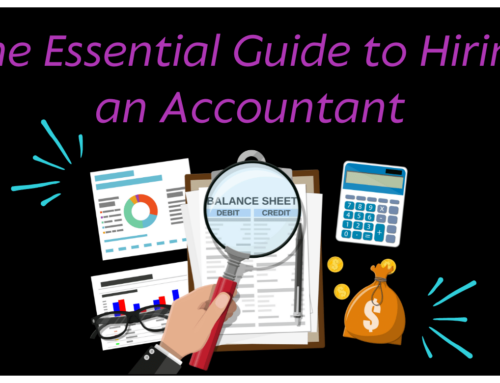Tax Deductions aren’t the only financial moves you can make; there are so many. I don’t know about you, but I am not sad to see 2017 go! It has been a crazy year of political drama, fake news, and natural disasters. There is still debris from Hurricane Irma in my neighborhood! The good news is there is still time left to make some financial moves to finish off the year strong. Here’s a list of things to do to wind down 2017.
For small businesses
1. Get your bookkeeping up-to-date for the year. If you fell behind, now is the time to catch up. There is no way to make any last-minute moves unless you know where you stand at this point.
Once you know what your net profits for the year are looking like, you can decide what to do. Want to show more income for 2017 than 2018? Try to get some extra income in December. Some ideas for this are running a year-end or special holiday promotion or asking clients to prepay for next year now at a discount. You can also keep expenses down by holding off on making purchases until January. Think the new tax reform will mean lower taxes in 2018? Slow down your collection efforts for the rest of the year and start up again in January. Stock up on supplies or make significant purchases (see 4. below) before the year is over.
2. Make sure you have W-9 forms for all of your contractors. All copies of the 1099-MISC forms for 2017 are due January 31, 2018! Ensure you have all of this information now, so you are ready to hand over that information to your CPA at the beginning of January. You need to file 1099-MISC forms for any individual, partnership, and certain LLCs that you paid over $600 to in 2017. You also need to give 1099-MISC forms to any lawyers you paid in 2017 and possibly your landlord.
1099-MISC filing has become a hot-button issue for the IRS. Every audit I have handled in the last year looked at the 1099-MISC filings. They issue penalties for slip-ups. The 2018 penalties for not filing correct information is:
Up to 30 days late – $50 per return/$187,500 max
31 days late through August 1 – $100 per return/$536,000 max
After August 1 or Not At All – $260 per return/$1,072,500 max
Intentional Disregard – $530 per return/No limitation
On top of these penalties, the IRS can also disallow the deduction, resulting in additional taxes owed!
3. Make significant purchases. If you’ve been contemplating buying a car, new computer, or other big equipment for your business, now is the time. You can take advantage of accelerated depreciation and get a full deduction for the entire cost, even though you purchase it in December!
Here is how to get a massive deduction for a car purchase. Use the “Hummer Tax Loophole,” or Section 179 deduction. Section 179 lets you deduct up to $510,00 in 2017 in fixed assets (vehicles, computers, furniture, etc.). There are special rules in place for autos, but if you buy a NEW car in December and document that it is 100% for a business, you can deduct $11,160. Document your mileage by keeping a log or using a mileage tracking app.
4. Check your payroll. S-corporation owners must run payroll. Not running payroll is a big “red flag” for the IRS. If you have a lot of cash may be run yourself a bonus payroll. Running a bonus payroll is useful if you need to show a higher salary on a W-2 or increase your Social Security contributions. It is also a great way to pay additional tax if you missed your estimated quarterly payments – and avoid penalties.
While on the subject of payroll – S-corporation owners need to make sure to enter their health insurance premiums in Box 1 of their W-2. Contact your payroll company to make sure it is correct. If you skip this step, your business cannot deduct the health insurance expense, and you cannot use the self-employed health insurance deduction on your return!
5. Set up or contribute to your retirement account. Retirement contributions will reduce your tax bill and set you up for financial success in the future. Examples of these kinds of accounts are a SEP, Simple IRA, or 401(k). They each have different rules such as participation and contribution limits, so choose wisely!
6. Write off business gifts. This is especially useful during the holidays. Just keep in mind only up to $25 can be written off.
Sometimes gifts can also be considered “meals and entertainment” – think show or game tickets. Deductions can only deduct meals and entertainment 50%. Here is one instance where the IRS is kind and lets you use whichever classification is more beneficial to you!
7. Make your s-election. If you are an LLC or a c-corporation and have been meaning to become an s-corporation, now is the time to file Form 2553 Election by a Small Business Corporation. You can have the election go into effect for January 2018.
For Individuals
1. Check your withholding. Did you under-withheld in your payroll this year to have more cash in your paycheck? Ask your CPA to make a tax projection for you to see if you will owe additional taxes. You can make estimated payments or pay in April when you file, but you could have some penalties to deal with.
2. Did you skip some of your estimated payments during the year? You should send them in ASAP to limit your penalties. The good news is you have until January 15, 2018, for the fourth quarter estimated payment due date.
3. Double up on real estate tax deductions. There might be a lot of changes to various itemized deductions with the proposed tax reform. If you are concerned that you might not take advantage of your deductions, such as real estate taxes, you can take advantage of them in 2017 by paying them before December 31. It would be a bonus if you paid 2016’s real estate taxes in 2017 as well.
4. Make your fourth quarter state income tax estimated payment in December 2017 instead of January 2018. This would allow you to deduct all of your state income tax payments in 2017 if the deduction wasn’t available anymore in 2018.
5. Be charitable. Now is a great time for charitable giving. Make sure you give to a legitimate 501(c)(3) organization. Make sure you keep documentation of the gift. If you give more than $250 to a charity, they must provide you a written acknowledgment.
You can donate items other than cash as well. Organizations will take cars, boats, stock, and other assets. If your donation property is worth over $5,000, you will need to get an appraisal.
6. Use your Flexible Spending Account funds. FSA funds are “use it or lose it,” so make sure you drain those accounts by December 31. Some employers give a grace period until March 15, but this is optional.
7. Max out your 401k. If you haven’t contributed all year or want to put away more money, you can put an enormous amount into your 401k with the last few payrolls. You might also be able to contribute from your year-end bonus (talk to HR).
As always, if there is anything I can do to help, please feel free to reach out!








